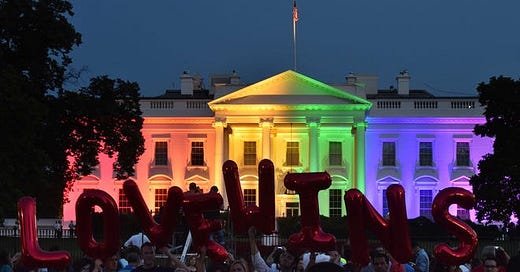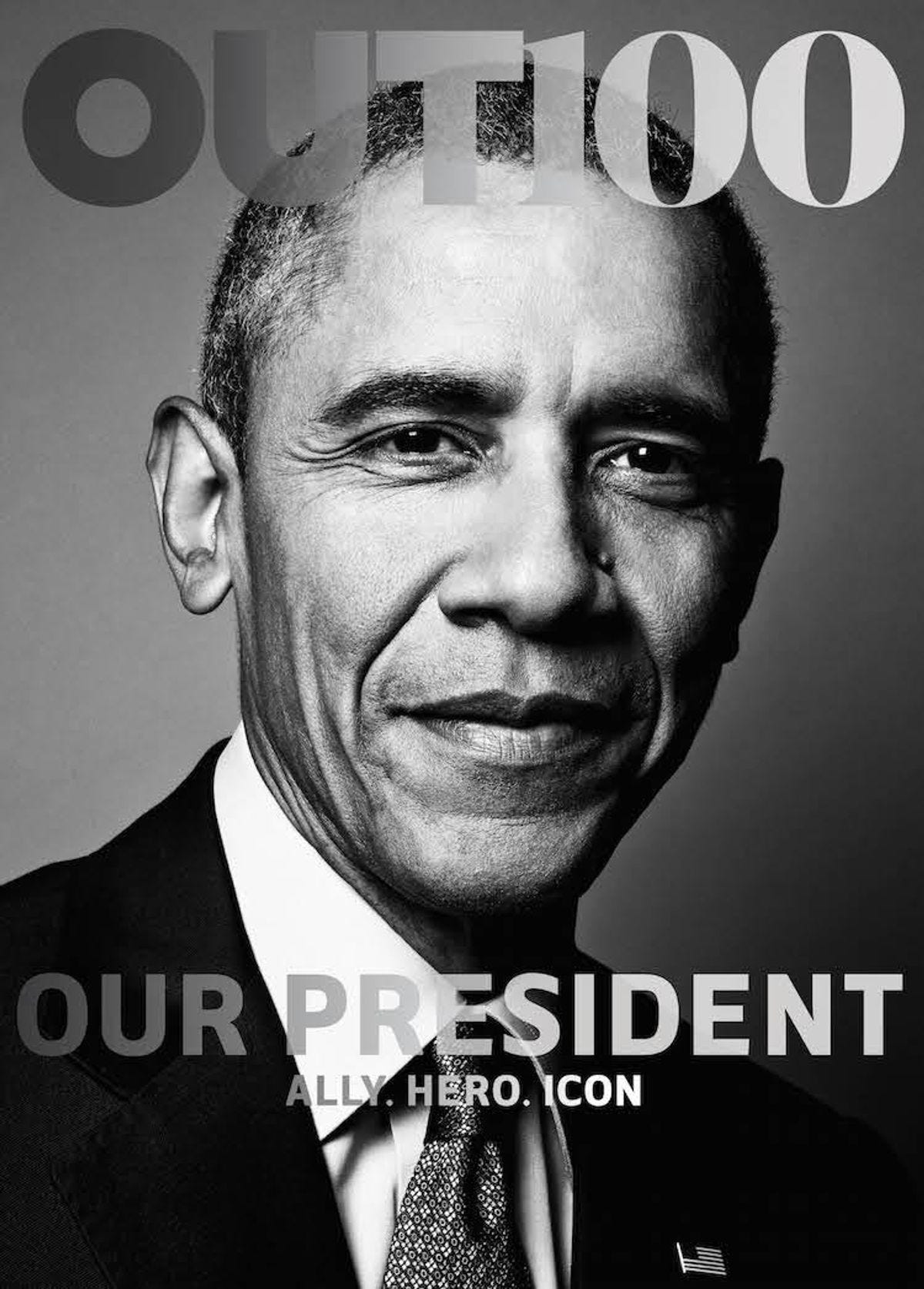10 Years Ago, Same-Sex Marriage Became Legal in the United States. Is It Now on the Chopping Block?
Tell us where you were on June 26, 2015, when you heard the news that "gay marriage" became legal and LGBTQ+ people were finally (in some respects) being treated as equal citizens.
On June 26, 2015, the Supreme Court of the United States ruled that the Fourteenth Amendment guarantees the right for same-sex couples to marry, requiring all states to license and recognize same-sex marriages. This landmark decision, a 5-4 ruling in the Obergefell v. Hodges case, effectively legalized same-sex marriage nationwide and built upon the 2013 United States v. Windsor case that struck down part of the Defense of Marriage Act.
And I was in another country.
I happened to be at an early dinner in London at an upscale restaurant along with most of the editorial staff of Out magazine when we read the news alert on our phones. Aaron Hicklin, the editor-in-chief, had organized this excursion as a fact-finding mission for our annual fall travel issue. What should have been a welcome treat for all of us felt bittersweet.
At least that night we danced with friends who worked for another queer publication based in the U.K., but we all wished we were with our friends and families back home. Seeing the Obama White House lit up in Pride colors that night was moving, as well as seeing all the joy during the New York City Pride Parade that weekend.
I’d been covering the marriage equality movement intensely ever since I joined the publication in the summer of 2011, the day after same-gender marriage1 became legal in the state of New York. Now, we were seeing the culmination of so much hard work grant LGBTQ+ people as equal citizens in the United States, and I wasn’t even in the country to celebrate with my community.
Later that year, we made up for it with our annual Out100 issue and celebration. We featured President Obama on the cover—the first time a sitting president had been photographed, interviewed and featured on a queer publication—which was an historic moment in its own right. Aaron visited the president in the White House and interviewed the “Ally of the Year.” Obama explained how there was a generational shift spurring so much change.
“To Malia and Sasha and their friends, discrimination in any form against anyone doesn't make sense. It doesn't dawn on them that friends who are gay or friends' parents who are same-sex couples should be treated differently than anyone else. That's powerful. My sense is that a lot of parents across the country aren't going to want to sit around the dinner table and try to justify to their kids why a gay teacher or a transgender best friend isn't quite as equal as someone else. That's also why it's so important to end harmful practices like conversion therapy for young people and allow them to be who they are. The next generation is spurring change not just for future generations, but for my generation, too. As president, and as a dad, that makes me proud. It makes me hopeful.”
I met Jim Obergefell later that year and was pleased to learn what a sweet and conscientious man he is. We partied with other queer trailblazers and so many enthusiastic people working to change the world. "The arc of the moral universe” seemed to be bending “toward justice," as Obama had so famously promised. Soon after I left my position, feeling like we’d accomplished so much and I was ready to move on to new adventures and challenges and stories.
When I emailed Jim to ask him what he thought he didn’t hedge:
“Marriage equality is on the chopping block. Alito and Thomas have made it clear they want to overturn Obergefell, and we certainly can’t trust the other four in the majority. The Respect for Marriage Act can be repealed. Even if it isn’t, should Obergefell be overturned, the Respect for Marriage Act doesn’t guarantee the right to marry, just recognition of marriage. So people who live in states with defense of marriage acts still on the books (like for me in Ohio) could once again have to leave their home state to get married. That isn’t marriage equality.”
That’s why it’s so heartbreaking to be celebrating the 10-year anniversary as we reel from the devastating 6-3 ruling in United States v. Skrmetti. The SCOTUS ruling upholds Tennessee’s ban on gender-affirming care for minors and delivers a major blow to transgender rights. Although the scope of the ruling is limited in some ways, it also strengthens the hurdles in the fight for LGBTQ+ rights in many more. It feels like we’re shrinking, withering and losing so much of the hard-won ground. This year, Pride will certainly feel like a protest, as we take to the streets to express our anger and show our strength.
I recently interviewed Greg Bourke, one of the plaintiffs in the landmark Obergefell case, about the current state of LGBTQ+ equality, the battles that remain to be fought, and his hopes for the future. In particular I was curious what he thought about the possibility that it could be overturned and what that would mean.
“For years, people would come to me and ask, “Are you concerned with what they might do with Obergefell? Are you concerned with what they might do with Roe v. Wade?” My response was always: “That is settled. I’m not worried about it. Listen to what they said in their testimony when they were being vetted in the Senate. That’s finished law, and we’re not gonna revisit that. They don’t overturn stuff like that!”
Then what happened?
So now I have an ultra-cautious approach, and I feel like it could happen; it might happen. Yes, we have the Respect for Marriage Act, and I think that’s great. We were there when it was signed, and I thought that was fabulous! I think it’s a very good protection. But I think what a lot of Americans are starting to feel is that anything that’s been done in the past can get undone very, very quickly these days—if people don’t stand up and fight for it and try to stop it from happening.
You know, I’m willing to do my part, but there’s going to have to be a whole lot of other people who stand up, too.”
He’s absolutely correct. We must all do our part. We can’t sit on the sidelines and let the “activists” bear all the burden. We each must make a decision to speak truth to power, in whatever way that is. I started The Queer Love Project as an act of resistance. Queer joy, queer love, queer relationships: these things scare many people, so we must not let ourselves be muzzled. Share your stories! That is one of the most powerful ways to “change hearts and minds”—even if you don’t feel like it’s your duty.
So I invite you to tell us where you were on that historic day. Remember how you felt? Tell us how you celebrated. Did you cry? Did you give a great and mighty yawp? Were you confused? But don’t stop there: Also share what you’re feeling during this Pride month, 56 years since the Stonewall Riots, which helped usher in a new era of LGBTQ+ civil rights.
Leave your thoughts and ideas in the comments, and we’ll amplify it on Notes and elsewhere and hopefully have enough to aggregate into a post to share far and wide.
I’m going to leave you with this wonderful message from Greg Bourke and his husband Michael DeLeon:
“If everybody just walks away, then the bullies are gonna win, the injustice is gonna remain, and nothing’s gonna get changed.”
I’m using same-sex and same-gender marriage interchangeably. The legalese all uses same-sex, but it’s actually quite complicated for queer people, and it’s widely considered more acceptable to use same-gender in 2025 since “same-sex” reaffirms the idea of binary genders.







Thank you for this thoughtful essay, Jerry. On 6/26/2015, my wife and I were on vacation in Oregon, staying at a hotel at the beach. I’ll never forget how I felt as I watched the breaking news on the television in our hotel room. The sun was just setting, and the sounds of the waves cresting, combined with this amazing news, brought a joy to my heart that I’ve only ever felt a handful of times in my life. We now know that even what seems settled case law can unravel under the heat and pressure of the extreme rightwing forces now in play. But oh, that glorious day!
Beautiful article, Jerry, and so grateful to you and all the other activists who together made marriage equality possible. I was part of the Vermont Freedom to Marry coalition that helped yield the first legal step toward marriage equality, which was called Civil Unions. What I remember about all the testimonies at the statehouse was that the only argument put forth by the “against” people was religion. Several state legislators ended up voting in favor, knowing that they would lose their seats (and most did). The testimony of the “for” people, meaning us, was all queer families talking about the various ways that lack of legal recognition of our families was hurting us…very human, very compelling. It was an incredible moral moment for our state.